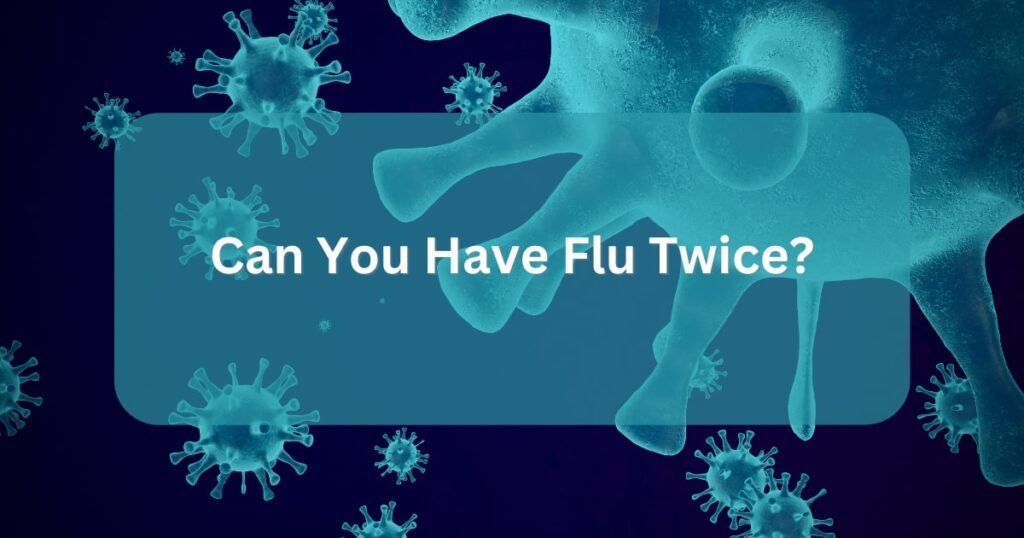The flu is one of the most common infectious diseases in the U.S., with an estimated 30 to 40 million people falling ill yearly.
As the flu season arrives, many people might experience symptoms like cough and fever. You might have already thought of your cold remedies to protect yourself during flu season, but one question still stays: Can you get the flu twice?
In this blog, we’ll explore why you may experience flu multiple times and the different types of strains that may cause it.
We’ll also share tips on how you can protect yourself from the flu. Let’s get started!
Is It Possible to Catch the Flu Twice in One Season?
Yes, you can get the flu twice in one season because there are different flu strains, such as Influenza A (H1N1, H3N2) and Influenza B. In the flu season, you can be infected by any of the flu strains.
However, if you have been infected once with a specific strain, then getting infected by the same strain is unlikely.
Your immune system responds to the particular strain that previously infected you, subsequently protecting you from the same strain.
During the flu season, other circulating viral strains can still infect you. Therefore, getting your flu vaccines timely is essential in preventing flu repeatedly.
Common Flu Symptoms
Flu symptoms can appear quickly and make you feel tired. During flu season, when the virus spreads rapidly, symptoms like fever and cough are common indicators that your body is fighting the infection.
The most common flu symptoms are:
- Fever
- Chills
- Cough
- Sore Throat
- Runny nose
- Headache
- Fatigue
If you experience any of these symptoms, consult your doctor for further evaluation, as getting medical advice early can prevent health complications in the future.
How Different Flu Variants Can Lead to Reinfection?
As the flu season arrives, we might see different strains of the virus that can affect people. The flu is not caused by a single virus; it contains different types of strains that can mutate and evolve and lead to reinfection.
When you get infected by the same strain of the flu, your immune system responds by producing antibodies that protect you from that strain for the next time.
However, you can still be infected by a different strain, as your immune system hasn’t developed antibodies against that specific strain.
How Flu Viruses Are Transmitted?
The flu virus, particularly influenza A and B, is highly contagious and can spread rapidly from one person to another. A virus can find multiple ways to enter your body and cause illness.
Here are some primary ways flu viruses are transmitted:
Respiratory Droplets
When an infected individual coughs or sneezes, they release droplets containing the flu virus; in this condition, people around that person can easily be infected.
Contaminated Surface
The droplets of the flu virus can survive on surfaces for many hours. If someone touches that surface, they can contract the virus.
Airborne Transmission
In some conditions, tiny particles of the flu virus stay in the air, so people around that air can be affected. Airborne transmission can make it easier for viruses to spread, especially in enclosed environments.
From One Person To Another
Close contact with an infected person can also transmit the virus, whether through shaking hands or sharing personal items. Respiratory droplets from an infected person can land in the mouth or nose of people who are around them; in this situation, people can be infected.
Can You Still Get the Flu After Vaccination?
Yes, you can still get the infection even after vaccination, but the flu vaccine helps reduce the severity of symptoms and shorten the duration of the flu.
Flu vaccines in 2024 are about 40% to 60% effective in reducing the risk of the virus. Therefore, there are mixed opinions on whether it can completely prevent the infection.
It also depends upon the timing. After you get the flu shot, it takes two weeks to build immunity, but if you catch the virus during this time period, you can still get infected.
Not to mention, becoming infected with a strain not included in the vaccine is possible. The flu shot is effective because if you get infected again, your symptoms will be mild and not get severe due to the vaccine.
Read more: Why does a flu shot make you feel sick?
Best Treatment Options for Multiple Flu Infections
Symptomatic Treatment
Most viral infections often resolve on their own within a week or two. Therefore, your doctor may focus on reducing the symptoms like fever, sore throat or cough. In severe cases, antiviral medicines may also be prescribed but rarely.
Preventive Measure
Getting a flu vaccine every year is the best way to protect your health, so don’t forget to get your flu vaccine.
Other steps that can prevent the risk of flu transmission are regular handwashing, using hand sanitizer, and avoiding contact with infected individuals.
Follow-up Care
If you are getting the flu repeatedly, you should always follow up with your healthcare provider for an accurate diagnosis. They will assess your overall health and provide treatment according to your condition.
When to Seek Medical Care For Flu?
Most of the time, flu causes mild symptoms that can be managed at home, but if your symptoms are getting worse day by day and if you are at risk for severe symptoms, then you should contact your healthcare provider.
Certain symptoms or situations in which you should visit your provider are:
- High Fever
- Shortness of breath
- Pressure in chest
- Sudden dizziness
- Repeated vomiting
- Extreme weakness
- People aged 65 and older
- People with heart and lung disease
- People with weak immune system
If you are not sure about your symptoms, it is better to consult your provider for clarity of your medical condition. Taking the right steps at the right time can avoid potential complications in the future.
Effective Ways To Prevent Reinfection From Flu Virus
Several steps can be taken to prevent the risk of getting the flu again. Viruses mostly spread in crowded places and enclosed environments, so preventive measures can reduce virus transmission.
The most common steps to prevent reinfection are:
- Practice good hygiene.
- Get vaccinated
- Avoid close contact.
- Wash your hands regularly.
- Avoid touching eyes or noses.
- Wear a mask in crowded places.
- Stay hydrated
How Family Urgent Care Can Help You Prevent or Treat Flu Reinfection?
Family Urgent Care offers rapid flu testing services, which can quickly diagnose the root cause and reduce the risk of virus transmission.
If necessary, we also provide follow-up visits for patients to further evaluate the disease. You can even connect with our doctor online if you cannot visit our clinic due to any reason.
On the other hand, if you want to get vaccinated, you can visit our clinic for flu shots to protect yourself from the upcoming flu season.
So, don’t wait until it gets worse! Visit Family Urgent Care for quick, reliable treatment. Book an appointment now and let our team care for you.
Frequently Asked Questions Related To Flu Twice A Week, Month Or Season
Your immune system protection lasts about six months, and after this time period, it starts to fade away because the amount of antibodies in your body starts decreasing. After the initial infection, you should have immunity from that previous strain, but you can still catch a different strain of the flu later.
There can be multiple reasons why flu keeps coming back, such as that there are different strains of flu and your body is immune to one specific strain but not to the other strain. The other reason is that if your symptoms are not getting better and they keep coming back, then it can also be something else, like an allergy or sinusitis.
Speeding up the flu recovery involves various steps such as getting proper sleep, inhaling steam, avoiding caffeine and alcohol, and managing your symptoms. By following these steps, you can speed up the flu recovery.
No, antibiotics do not help the flu caused by viruses. Antibiotics are medications that fight infections that are caused by bacteria, and flu is caused by the influenza virus. Using antibiotics for the flu can also lead to unnecessary side effects. It’s important to consult your doctor for appropriate medications.

